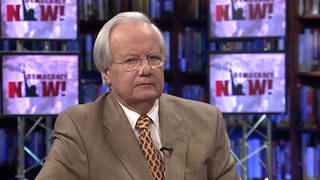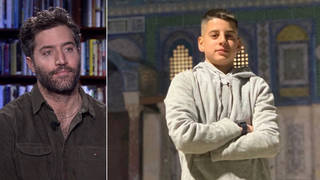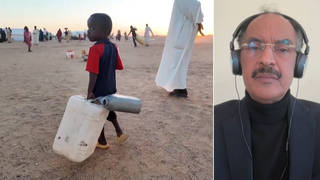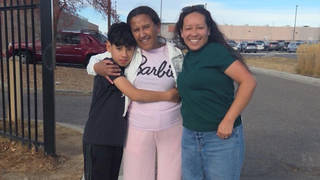
Sudan’s military has withdrawn from El Fasher, its last stronghold in the country’s Darfur region, ceding control of the city to the paramilitary Rapid Support Forces after an 18-month siege. The United Nations and the African Union have called for safe passage for civilians and an immediate ceasefire, condemning reports of war crimes by RSF fighters including summary executions of civilians. Fighting between the Sudanese military and RSF has killed more than 150,000 people and displaced about 12 million since 2023.
“This just shows us that what the Sudanese Armed Forces have been promising, which is a military victory that is going to end the war, is nowhere near happening,” says Sudanese activist Marine Alneel, joining us from Nairobi, Kenya. She says the capture of El Fasher raises fears of “basically two governments” and calls on external powers, including the United Arab Emirates, which backs the RSF, and the United States, to push for humanitarian measures.
Transcript
AMY GOODMAN: The United Nations is repeating its call for an immediate ceasefire in Sudan, after the UAE-backed Rapid Support Forces seized control of the city of El Fasher in Darfur after a 17-month siege. On Monday, the head of the African Union called for the opening of humanitarian corridors to allow lifesaving aid to reach those in need. The African Union also condemned reports of war crimes in El Fasher. One group allied with the Sudanese military has claimed the RSF has, quote, “executed more than 2,000 unarmed civilians,” unquote, since taking control of El Fasher.
The fall of the city is seen as a major blow to the Sudanese military. On Monday, Sudan’s army chief, General Abdel Fattah al-Burhan, announced the withdrawal of his soldiers from their last stronghold in Darfur.
GEN. ABDEL FATTAH AL-BURHAN: [translated] Everyone has followed what has happened in El Fasher. Certainly the leadership there, including security, made assessments that they have to leave the city due to the systemic destruction and killing of civilians. We agreed with them to leave the city and to go to a safe place, so as to spare the rest of the citizens and the rest of the city from destruction.
AMY GOODMAN: On Monday, the U.N. humanitarian coordinator in Sudan, Denise Brown, warned of the escalating humanitarian crisis in El Fasher and throughout Sudan.
DENISE BROWN: There’s been a blockade for now over — over 500 days, a blockade of humanitarian assistance going in for those civilians. So, I just want to reiterate, there are civilians in El Fasher. It is a fact. And once again, and we’ve said it dozens of times, the U.N. calls on the RSF to allow safe passage for them, for them to leave. Particularly as the fighting has intensified over the past 24 hours, these individuals are at increased risk of being injured or killed. OHCHR has, just a few minutes ago, reported on a multitude of reports of summary executions of unarmed men and civilians in El Fasher.
AMY GOODMAN: The Sudanese military and the UAE-backed RSF have been fighting since 2023. Since then, more than 150,000 people have died across Sudan. About 12 million have fled their homes.
We go now to Marine Alneel, a Sudanese activist, usually joins us from Khartoum or in Sudan, but is now in Nairobi, Kenya.
Marine, can you talk about the significance of the RSF taking over El Fasher, the role of the UAE and the level of famine in this city, what it means for the whole country?
MARINE ALNEEL: The most important aspect of the RSF taking control of El Fasher is the humanitarian aspect. We’ve seen the situation in El Fasher in the months of the siege, which were about 18 months of siege, and during that time, the RSF built barricades from sand that just completely surrounded the city, making sure that no one goes in or out, except through one — what they called a safe corridor. And it was anything but safe. People were facing multiple violations through that route.
And during the time of the siege, we’ve seen the level of famine in El Fasher rise to something we’ve not seen in other areas in Sudan. Even just a sack of millet, which is the staple, or was the staple, in El Fasher, rose to over $1,000. And people started basically depending on animal feeding to feed themselves and their families. And that has been the situation for months.
So, now with the RSF taking over the city and entering the city and taking over the 6th Infantry of the Sudanese Armed Forces, the biggest fear is what’s going to happen to the civilians. We know that there the RSF does not differentiate between military and civilians, and they’ve been explicitly saying there are no civilians in El Fasher, which is not the reality. So, this is the fear now of what’s going to happen to the civilians. And we’re already seeing grave violations happening to the people: executions, detentions, targeting of volunteers, targeting of journalists. We’ve seen the detention of journalists, as well.
And when it comes to what does this mean for the war in Sudan in total, this just shows us that what the Sudanese Armed Forces have been promising, which is military victory that is going to end the war, is nowhere near happening. And if they keep insisting that they must win with a military victory, then this is just going to prolong the war more and more and causing more civilians harm, because both parties are indiscriminately attacking, whether these are civilians or from the other warring party, and also indiscriminately attacking infrastructure. They’ve attacked healthcare infrastructure. About 80% of the hospitals are out of service now, and let alone all the medical staff that have also fled the country. So, we’re seeing with the harms that the war is causing, we’re also seeing the healthcare situation deteriorating very quickly. And this is something that is impacting places like North Darfur very heavily and also impacting the rest of the country.
JUAN GONZÁLEZ: And could you talk, Marine, about the significance of the city of El Fasher to the both sides, why they have fought so hard now for so long over control of the city?
MARINE ALNEEL: Yeah, well, it is the last stronghold of the Sudanese Armed Forces in Darfur. And this is one of the fears that is also a lot of Sudanese people are afraid of facing or afraid that the country will face now, is the
prospect of having basically two governments, because already the RSF have announced a parallel government, and now with them taking control of El Fasher and also taking control, about two days ago, of Barah, which is another strategic city, in North Kordofan. So, the fear of having two governments now, which will lead to longer destabilization that could — not being able to end it, whether militarily or through negotiations, since SAF is not is not accepting any negotiations at the time. There are no negotiations happening directly or indirectly.
So, with the RSF taking control of El Fasher, this fear is growing about having the country destabilized for longer, about having two governments, and also the fear of the back-and-forth of RSF taking control and SAF taking control of areas, which causes more and more violations. Every time you have this movement of the two warring parties, you see a spike in humanitarian violations. You see a spike in gender-based violence and sexual violence. And you see, obviously, a spike in detention and executions, extrajudicial executions, that are being done by both parties, accusing civilians, or maybe not civilians — we don’t know, because there are no trials happening — accusing them of collaborating with the other party, and executing them extrajudicially based on that.
JUAN GONZÁLEZ: And could you talk about the role of outside powers in this war, specifically United Arab Emirates, or other regional powers? What do they have to gain from continuing to stoke this war?
MARINE ALNEEL: Well, the United Arab Emirates is playing multiple roles in this war. We know that it has been backing the Rapid Support Forces. And on the other hand, it still has relations with the government that is the Sudanese Armed Forces. And we’ve seen how big of a role it plays on the other side, as well, especially recently when the air flights between Port Sudan and the UAE were stopped, and we’ve seen the amount of gold imports that have been halted due to that. So, the UAE has a vested interest in Sudan. It has been supporting the Rapid Support Forces. And at the same time, it is continuing to have relations with the Sudanese Armed Forces. So, I think that the lack of stability does facilitate more importing of gold from Sudan that is not being regulated. And at the same time, they’re still also importing the — legally — gold from Sudan.
And at the same time, it’s part — the UAE is part of the Quad that is trying to lead negotiations between the two warring parties. And the existence of UAE in that Quad has been one of the reasons that’s being stated by the Sudanese Armed Forces as a reason that they cannot trust the Quad to lead these negotiations.
So, we know that the United Arab Emirates can have a lot of impact. It can control, or at least impact, the flow of weapons and ammunition to the Rapid Support Forces. It can also pressure the Sudanese Armed Forces through their economic relationship. And it can also impact both parties through its contribution in the Quad. So, they’re able to influence the situation to something better, if that was their priority. But we know very well that the priority is the economic gains that they have from Sudan.
AMY GOODMAN: So, finally, Marine Alneel, what do you feel can be done at this point? What is civil society calling for? Talk about what the U.N. and — we’re speaking to you from the United States — what the United States can do. What does civil society want?
MARINE ALNEEL: At this moment, what’s important, we have an urgent situation that is happening now in El Fasher, so there is a need for urgent help. There is a need for having the aid reach the people. We’ve had over a thousand families fleeing El Fasher and reaching Tawila, a nearby town. And all of these people are in need of — are in desperate need of humanitarian assistance. That needs to be organized. There are groups that are working on the ground. There are community-based groups. There are grassroots groups that are working on the ground, and that can be supported.
And when we’re talking, on the other hand, what can be done from the United States, I think — I mean, the United States is also part of the Quad, so people in the United States can work on influencing the United States by prioritizing the safety of the people and the livelihoods of the people. We’ve heard the special envoy of the U.S. say that their main concern — this was before the takeover of El Fasher — their main concern is the relations between the Sudanese Armed Forces and Islamic movements. And I think it’s important to move the main concern from any power-sharing prospects to what is happening to the people now on the ground, especially when we have such a dire situation.
And another area that can be also very impactful is to see some seriousness in the measures that the U.S. is taking. We’ve seen them impose sanctions on a number of Rapid Support Forces leaders, while at the same time there are reports of Rapid Support Forces leaders roaming freely in Washington, D.C., actually. So, there is a question of how serious are these measures that are being taken against the perpetrators to try to pressure, to pressure them to prioritize the humanitarian situation right now and pressure them into at least a humanitarian ceasefire, like the Quad has suggested for three months. There can be more seriousness taken into these measures, so we can see the warring parties prioritizing also the safety of the Sudanese people, because at this moment, and as we’ve seen for two years, the priority of both warring parties was reaching power, basically, while the international actors’ priorities have been related to economic interests, as well as interest in not destabilizing the entire region.
AMY GOODMAN: Marine Alneel, we want to thank you for being with us, Sudanese activist, joining us from Nairobi, Kenya.
Coming up, the government shutdown enters its 28th day. Forty-two million Americans will soon lose federal food assistance. We’ll look at why millions are seeing soaring healthcare premiums, and what can be done about it. Stay with us.













Media Options